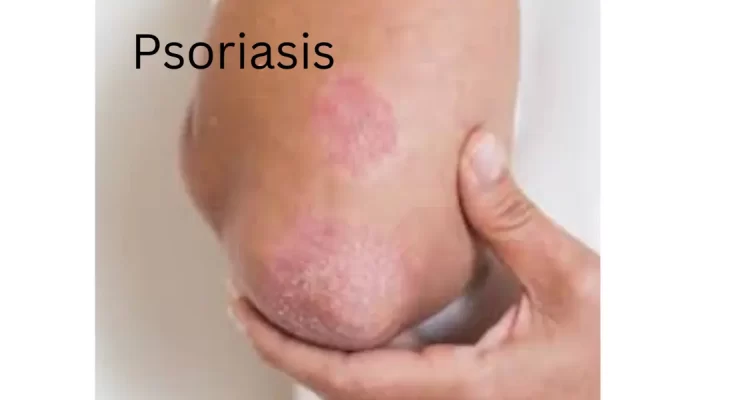Psoriasis is a chronic autoimmune illness that affects millions around the world. Psoriasis affects not only the skin but also the immune system. People with frequently endure physical discomfort, social anxiety, and emotional misery as a result of the visual signs.
What Is Psoriasis?
Psoriasis is a disorder in which skin cells proliferate up to ten times faster than usual. This expedited process causes an accumulation of dead skin cells on the surface, resulting in thick, scaly patches. These spots, or plaques, are often red, dry, and coated in silvery-white scales. typically affects the scalp, elbows, knees, and lower back, but it can arise anywhere on the body.
Despite being a skin ailment, is a systemic autoimmune disorder in which the body’s immune system mistakenly targets healthy cells. In this situation, the immune system causes an overproduction of skin cells, resulting in inflammation and scaling.
Common Symptoms of Psoriasis
Psoriasis can have several forms, each with its own unique set of symptoms. Most kinds of the illness do, however, share some common symptoms. Understanding these signs helps to diagnose the problem early and seek suitable therapy.
Plaque Formation
“The formation of plaques typically appears as elevated, red spots covered with a silvery-white layer of dead skin cells These plaques can vary in size and cause itching or soreness.
Itching and burning sensations
Inflamed skin areas can create extreme itching and burning sensations. Scratching the affected areas frequently exacerbates the symptoms, potentially leading to blood and increased aggravation.
Cracked Skin
Psoriasis can create dry skin, resulting in painful fissures. These cracks might occasionally bleed, making the situation much more painful for the person affected.
Nail Changes
Nail can lead to pitting, discoloration, and irregular nail growth. Onycholys is is a condition in which nails loosen and detach from their nail beds.
Joint Pain
Around 30% of patients with may develop psoriatic arthritis, a disorder that causes joint swelling, stiffness, and discomfort. If not treated, psoriatic arthritis can be severely disabling.
Causes of Psoriasis
While the specific cause of is uncertain, researchers believe it stems from a combination of hereditary and environmental factors. Understanding these factors can help people better manage their symptoms.
Immune System Dysfunction
In psoriasis, the immune system incorrectly recognizes healthy skin cells as foreign invaders. As a result, it causes an inflammatory reaction, resulting in an excess of skin cells. This immune system malfunction lies at the heart of development.
Genetic Predisposition
A family history of considerably raises the risk of developing the disease. Certain genetic markers have been associated with , indicating a hereditary component. However, not everyone carrying these genetic markers will acquire psoriasis
Environmental Triggers
Psoriasis flare-ups can be caused by environmental factors, even in patients with a congenital predisposition. Some common environmental triggers are:
Stress: High amounts of stress might trigger the onset of or worsen symptoms.
Infections: Bacterial or viral infections, such as strep throat, can cause , especially in children.
Skin Injuries: Cuts, burns, and even insect bites can cause psoriasis in the affected area, a condition known as the Koebner effect.
Medications: Certain drugs, such as beta-blockers and antimalarials, can cause or exacerbate psoriasis.
Weather: Cold, dry temperatures can dry up the skin, causing flare-ups, while warmer climes tend to relieve symptoms.
Types of Psoriasis
Psoriasis can take many various forms, each with its own set of characteristics. Understanding the differences between these categories is critical to proper therapy and management.
Plaque Psoriasis
This is the most prevalent kind, accounting for roughly 80% of all cases. Plaque results in elevated, crimson plaques covered in dead skin cells. These plaques frequently occur on the scalp, knees, elbows, and lower back.
Guttate Psoriasis
It is distinguished by little, dot-shaped lesions. This type is frequently caused by bacterial illnesses such as strep throat.
Inverse Psoriasis
This form is seen in body folds such as under the breasts, in the crotch, and around the buttocks. It results in smooth, red spots that are exacerbated by friction and sweat.
Pustular Psoriasis
These pustules are loaded with non-infectious pus and can occur on the hands, feet, or all over the body.
Erythrodermic Psoriasis
Erythrodermic psoriasis is a severe type of the disease that causes a red, peeling rash across the entire body. This variety is uncommon but requires rapid medical attention due to the possibility of serious complications.
Treatment Options for Psoriasis
Although cannot be cured, a variety of therapies can help manage symptoms, reduce inflammation, and improve skin appearance. Treatment options are determined by the severity of the ailment, type of and how the individual responds to various treatments.
Topical Treatments
Topical therapies are frequently the first line of defense against mild to moderate These lotions and ointments are used directly on the skin to minimize inflammation and slow cell formation. Common topical therapies include:
Corticosteroids: These are the most popular topical drugs for decreasing inflammation and relieving skin irritation.
Vitamin D Analogues: These synthetic versions of vitamin D inhibit skin cell proliferation and minimize scaling.
Topical Retinoids: Derived from vitamin A, retinoids help reduce inflammation and control cell turnover.
Phototherapy
In moderate to severe cases, phototherapy (light therapy) may be indicated. This treatment exposes the skin to ultraviolet (UV) light, slowing skin cell proliferation and reducing inflammation. Phototherapy can be administered in a clinical environment or at home using a specialized UV lamp
Conclusion
Psoriasis is a difficult, chronic disorder that affects not just the skin but also the quality of life for those who have it. Understanding the symptoms, causes, and treatment choices available can help people better manage their illness. People with can live better, more pleasant lives if they take the proper approach, which includes medical treatments and lifestyle changes
Psoriasis is caused by an overactive immune system that speeds up skin cell production, leading to inflammation and scaling. Genetic and environmental factors can trigger it.
No, psoriasis is not contagious. It is an autoimmune condition, not an infection.
Common signs include red, scaly patches on the skin, itching, and dryness. A dermatologist can provide a definitive diagnosis.
There is no cure for psoriasis, but treatments can manage symptoms and improve skin appearance.
Treatments include topical medications, phototherapy, systemic drugs, biologics, and lifestyle changes.



